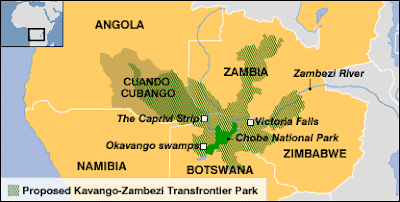
By Letlhogile Lucas
BBC Focus on Africa, Gaborone
Plans to create the world's largest game park are being finalised at a meeting in Botswana in southern Africa.
The planned conservation area will straddle the borders of Angola, Botswana, Namibia, Zambia and Zimbabwe.
It is hoped the park will bring in tourists to such attractions as the Victoria Falls, Okavango swamps, Chobe National Park and Caprivi Strip.
Officials believe it will also help regional tourism ahead of the 2010 World Cup taking place in South Africa.
The prosposed Kavango-Zambezi Transfrontier Park will cost an estimated $100m to set up and is expected to contribute significantly to job creation in the five countries.
Africa's biggest game park at the moment is the 35,000-square-kilometre Great Limpopo Transfrontier Park on the borders of Mozambique, South Africa and Zimbabwe.
Click to see a map of the area the park will cover
While the southern African region has big potential as a tourist destination, those meeting in Botswana's capital, Gaborone, say much needs to be done to attract tourists to the region.
At Thursday's gathering tourism ministers and environmental experts are hammering out a joint conservation policy.
"The major issue is about sustainable tourism," Botswana's Tourism Minister Kitso Mokaila told the BBC.
"Tourism is a revenue generator and therefore if we can get the conservation issue right then I think we can start talking more positively and more confidently about sustainable tourism."
Among the obstacles cited were the landmines scattered in the Cuando Cubango region of Angola, where a 27-year civil war ended in 2002.
"What we want right now is to make sure that the funds that are available for the de-mining to proceed as soon as possible," said Eduardoa Chingunji, Angola's tourism minister.
"But let's not forget that at times also the question of landmines in Angola is overblown... there are specific areas where there were battle lines for a long time - that's where you find the concentration.
"The priority right now is to de-mine a major part of the border that is between the countries," he said.
Another issue the ministers have been grappling with is the bad image associated with Zimbabwe that could well tarnish their park project.
Tourists tend to shun Zimbabwe because of the political and economic strife there.
But Mr Mokaila said he did not see politics coming in the way of business.
"When I was in the Victoria Falls all I could see were tourists all over the show. Obviously if the Zimbabwe situation were to change it would also enhance what we're doing.
"But I think that the very fact that we're also involved with them in these negotiations also assists their issues."
As well as finding a common position on issues of tourism and the management of the wildlife, it is also hoped that the project will assist in region's economic integration.